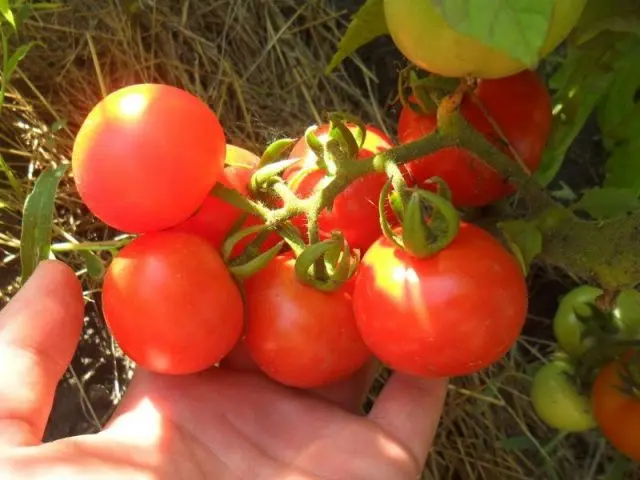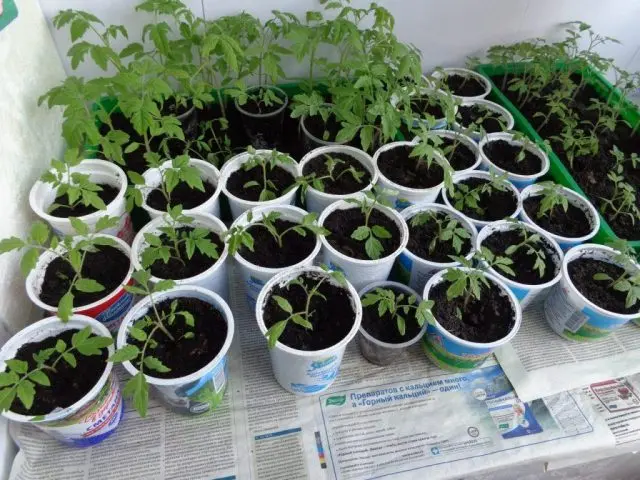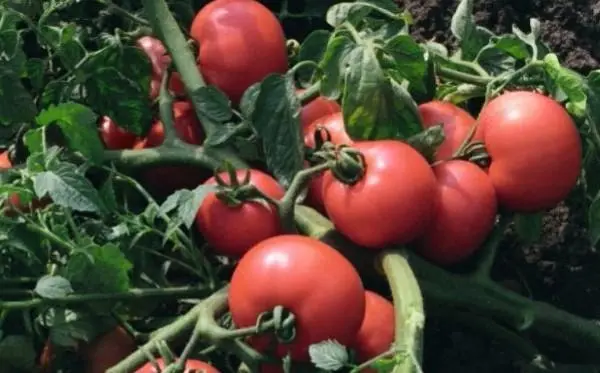Contents
Tomato Sultan F1 of the Dutch selection is zoned for the south and central Our Country. In 2000, the variety was included in the State Register of the Federation, the originator is Bejo Zaden. The rights to sell seeds are assigned to the companies Plasma Seeds, Gavrish and Prestige.
Description of tomato Sultan F1

Mid-early hybrid tomato variety Sultan F1 of the determinant type is recommended for growing in greenhouses and open ground. The technical ripeness of tomato fruits occurs in 95-110 days from the moment of germination. It takes about two more weeks for the tomatoes to fully ripen.
A low bush (60 cm) is covered with dark green leaves. Simple inflorescences consist of 5 – 7 light yellow flowers collected with a brush at the joints.
A dense non-standard stem of tomatoes of this variety does not require a garter.
Description of fruits
Beef-type tomatoes reach a mass of 180 g. The fruits are fleshy, bright red in color when fully ripe. Contain a small amount of seeds in 5 – 8 seed chambers. The shape of the tomatoes of this hybrid variety is round with a slight ribbing at the stem.
Ripe Sultan tomatoes contain up to 5% dry matter and up to 3% sugars. Rich in vitamins and amino acids, tomatoes are sweet in taste.
Sultan F1 is classified as a universal variety. The fruits are suitable for salads and pickling.
Characteristics of the variety Sultan F1
Variety Sultan F1 refers to high-yielding. When creating optimal growing conditions, the yield from one bush can reach 4-5 kg.
An extended fruiting period allows you to increase the yield of tomatoes when grown in greenhouses and film shelters.
According to the characteristics, the tomato variety Sultan F1 is drought-resistant. The crop bears fruit even on soils with a low level of fertility.
The plant is resistant to most specific tomato diseases.
Advantages and disadvantages
According to the reviews and photos of those who planted the Sultan tomato variety, it is easy to determine the advantages of the variety:
- unpretentiousness;
- high productivity;
- long fruiting period;
- excellent taste characteristics;
- resistance to diseases;
- good portability of transportation;
- high keeping quality.
The impossibility of collecting seeds of the tomato variety Sultan is considered a disadvantage by vegetable growers.
Growing rules
Tomatoes of the Sultan variety are grown in seedlings. In the southern regions with a long period of high air temperatures, you can get a crop of tomatoes by direct sowing seeds into the ground.
Planting seeds for seedlings
Seeds of the Sultan F1 hybrid are being prepared and tested for germination. Therefore, pre-soaking in water or seed germination accelerators is not recommended.
By the time the tomatoes are planted in the ground, the seedlings should reach the age of 55 – 60 days.
To obtain high-quality planting material, the soil should be chosen light and breathable. It is recommended to use a soil mixture of equal parts of soddy soil, river sand and peat with a neutral level of acidity.
For germination of tomato seeds, low containers with holes in the bottom are suitable. For this you need:
- Fill the box halfway with soil.
- The soil is lightly compacted and watered with warm water.
- Spread the seeds at a distance of about a centimeter from each other.
- Sprinkle with a layer of soil of at least 1 cm.
- Cover with foil.
- Germinate at a temperature not lower than 22 – 24 degrees.
With the advent of the first shoots, remove the film, put the seedlings in a bright place.
Tomatoes are easy to transplant. Plants can be dived into separate glasses or boxes of several pieces.
Seedling picking is carried out with the development of two true leaves in a highly moistened soil.

After transplanting, containers with tomatoes are recommended to be installed for 2 – 3 days away from direct sunlight.
Before planting tomatoes in a permanent place, it is necessary to feed the plants at least twice with complex fertilizer.
To improve the development of the root system, you can use special root-forming dressings “Kornevin”, “Zircon” or any other growth stimulants. Top dressing helps the formation of a powerful root system and accelerates the development of healthy seedlings.
It is necessary to water the seedlings with water at room temperature regularly, avoiding the drying of the earthen coma.
Before planting in the ground or greenhouse, hardening of plants should be carried out. To do this, the temperature in the room is reduced gradually by 1 – 2 degrees. If the weather permits, then the boxes with seedlings can be taken out into the open air. The temperature should not be below 18 degrees. Hardening is carried out, evenly increasing the period of exposure to low temperatures.
Seedling transplant
Tomato seedlings can be planted in open ground only after the threat of spring frosts has passed. When the temperature drops below 10 degrees, film shelters should be used.
Compact tomato bushes of the Sultan variety are planted in the greenhouse according to the scheme: 35 – 40 cm between the bushes and about 50 cm between the rows. Landing can be done in a checkerboard pattern.
The soil must be loosened to a depth of 30 – 40 cm. Compost or rotted manure should be poured into the holes prepared according to the marking at the rate of 0,5 liters per plant.
It is important to water the seedlings and holes prepared for planting with plenty of water.
Landing algorithm:
- Remove the seedling from the seedling container.
- Shorten the main root by a third.
- Install in the hole.
- Sprinkle with soil to the height of the stem up to 10 – 12 cm.
- Compact the soil around the plant.
It is advisable to plant tomatoes in the evening or in cloudy weather.
Aftercare
The entire growing season of tomatoes must be monitored for soil moisture. Regular watering, alternating with loosening the soil around the bushes, will help accelerate flowering and ovary development.
10 days after planting the seedlings in a permanent place, it is necessary to fertilize with a complex fertilizer containing phosphorus, potassium and trace elements. For the formation of a bush, nitrogen is also required to build up green mass. It is recommended to use nitroammophoska or calcium nitrate. The method of application of the fertilizer and the dosage are indicated on the packaging of the drug.
Bushes of the tomato variety Sultan F1 can not be tied up. Low-growing tomatoes with a thick elastic stem perfectly withstand the weight of the fruit.
Experts advise to form a bush in 2 trunks. But, according to reviews of the Sultan F1 tomato, with a sufficient level of soil fertility and proper care, you can increase the yield by leaving an additional stepson.

Pasynkovanie should be carried out regularly, preventing the growth of side shoots. Removing large stepchildren threatens the plant with stress, which negatively affects development and yield.
For the second and third top dressing, which can be carried out at intervals of 2 weeks during fruit set, it is recommended to use a complex of minerals with a high content of potassium and phosphorus. Nitrogen fertilizers should be avoided. With their overabundance, tomatoes begin to intensively increase their green mass to the detriment of the fruits.
With the simultaneous development of a large number of fruits, some of the unripe tomatoes must be removed from the bush. Sultan tomatoes, according to reviews, can ripen in a dark place, packed in cardboard boxes.
To protect against fungal diseases in the greenhouse, it is necessary to provide tomatoes with stable ventilation. Sultan tomatoes tolerate drought more easily than excessive moisture. In order to prevent diseases, bushes can be treated with a solution of Bordeaux liquid, Quadris, Acrobat or Fitosporin preparations. Subject to the rules and terms of processing, the drugs are safe.
To protect plants from whiteflies, mites, aphids and the Colorado potato beetle, it is recommended to use standard chemical and biological agents.
Conclusion
Tomato Sultan F1, due to its unpretentiousness, is suitable for growing beginner growers. A fairly high yield of tomatoes of this variety is obtained even under adverse weather conditions. From bright sweetish-sour fruits make a thick tasty juice. Smooth tomatoes in jars of marinades look great.









